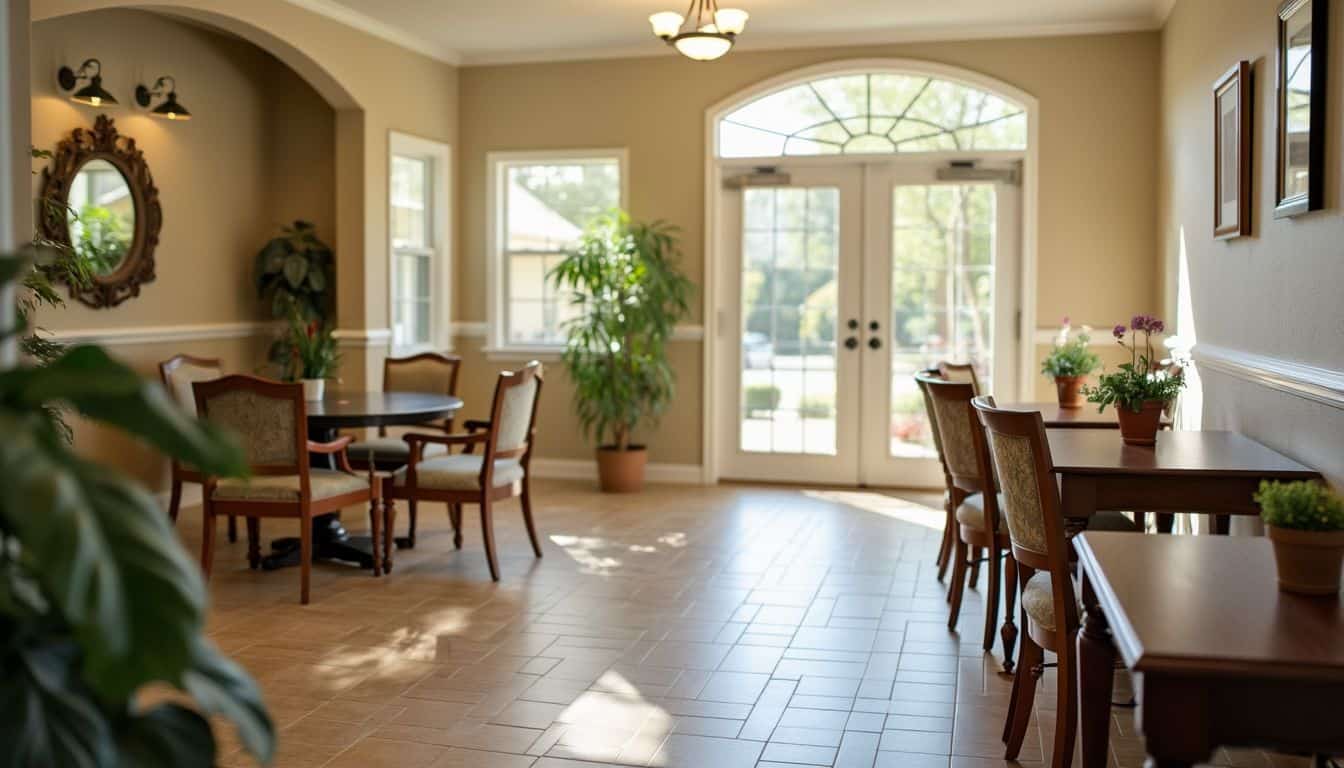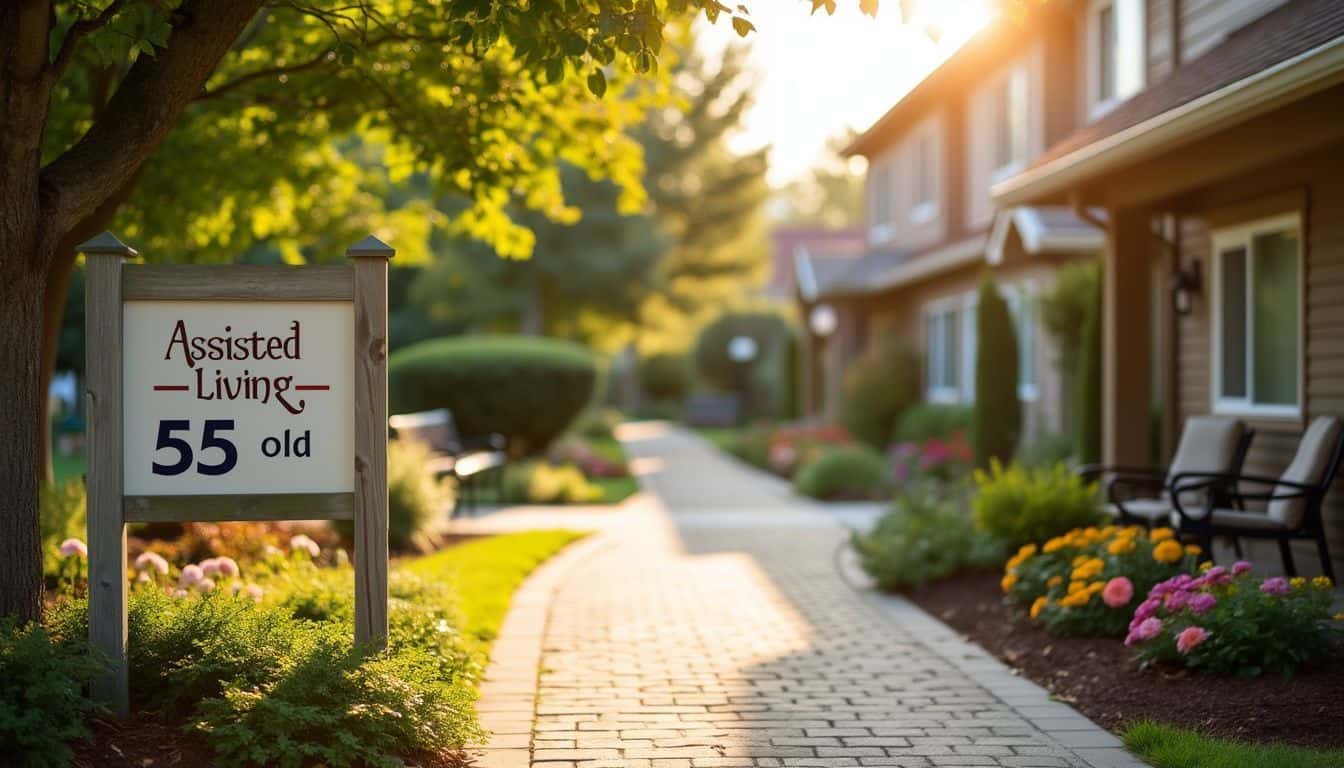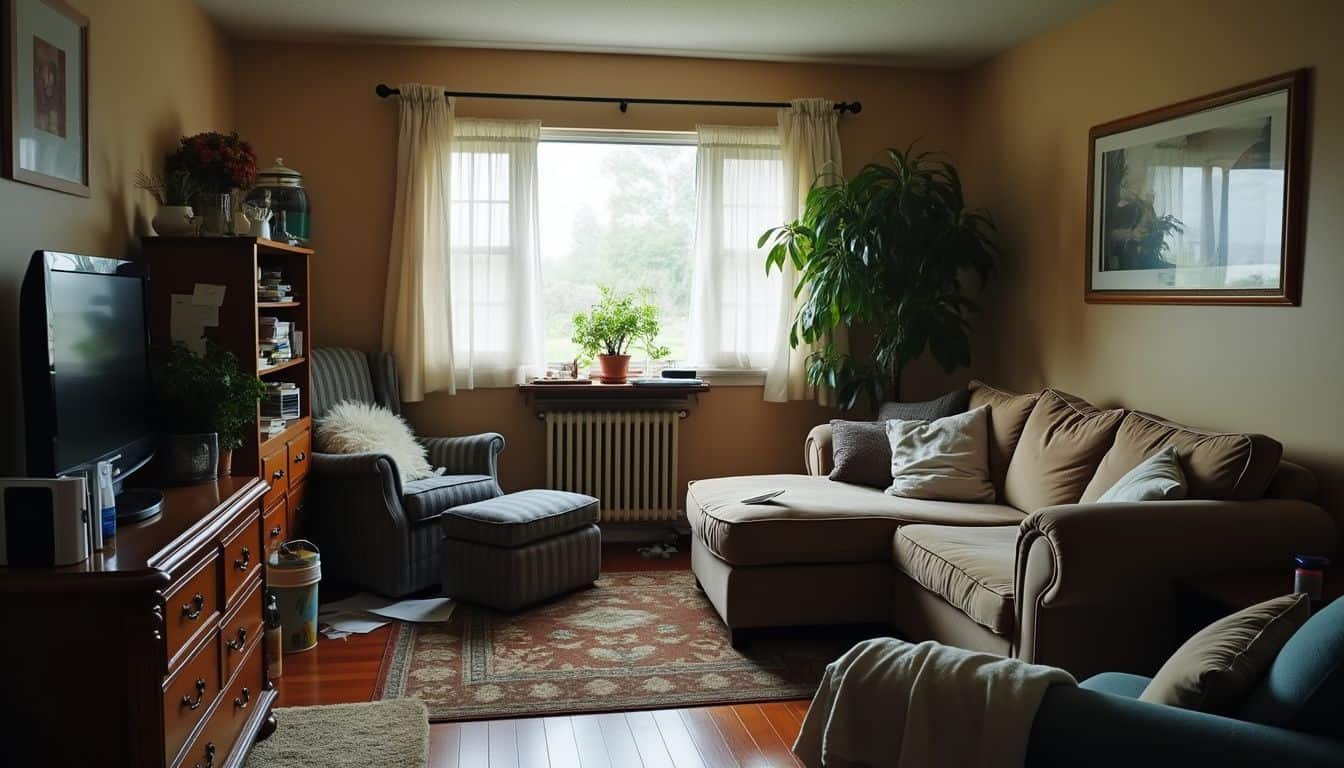Are you wondering if your loved one qualifies for assisted living? It’s a common question that many families face. Assisted living facilities offer a supportive environment for older adults who need help with daily tasks.
This article will break down the 8 key criteria that determine who qualifies for assisted living facilities. Let’s explore!
Key Takeaways
Assisted living is for adults 55++ who need help with daily tasks but don’t require full-time nursing care. Most residents are 85 or older.
Key criteria include age, health needs, ability to do daily activities, and financial resources. Medicaid may help cover costs in some cases.
Health checks and admission assessments determine if someone qualifies. These look at physical and mental health, medications, fall risk, and social needs.
People with severe health issues like advanced dementia or who need constant bed care usually don’t qualify for assisted living.
Other options include independent living, nursing homes, and home care services. The right choice depends on individual needs and preferences.
Table of Contents
What Is Assisted Living?

Assisted living is a home away from home for older adults. It’s a place where folks get help with daily tasks but still keep their freedom.
Definition and Objectives

Assisted living is a special kind of home for older folks who need a hand with daily tasks. It’s not quite a nursing home, but it’s more than living alone. These places aim to keep seniors safe and happy while giving them some freedom.
They offer meals, help with meds, and aid in getting dressed or bathing. But residents still do some things on their own.
The goal is to make life easier and more fun for older adults. Most people in assisted living are 85 or older. They often need help with several daily activities.
Assisted living is about finding the right balance between support and independence.
Each state has its own rules about what these homes can do. Next, let’s look at the different types of care they provide.
Varieties of Care Services

Building on the core purpose of assisted living, let’s explore the different care options available. Assisted living facilities offer a range of services to meet diverse needs. These services can vary widely from one place to another.
Most facilities provide basic care like meals, housekeeping, and help with daily tasks. But many go beyond that. Some offer memory care for folks with Alzheimer’s or other types of dementia.
Others have special programs for managing diabetes or heart conditions. You might find places with physical therapy, social activities, or even pet care. It’s like a buffet of services – you can pick what suits you best.
The key is to find a place that fits your unique needs… and makes you feel at home.
Who Is Eligible for Assisted Living?

Thinking about assisted living? Let’s talk about who fits the bill. Age and health needs play a big role in deciding if it’s right for you or a loved one.
Age Criteria

Most assisted living places prefer residents to be at least 55 years old. But don’t worry if you’re not quite there yet! Some spots might be flexible with their requirements. It’s like a community for adults who need some extra support.
Here’s an interesting tidbit: over half the people living in these homes are 85 or older. That’s right – 55% of residents have celebrated many birthdays! So if you’re considering assisted living for yourself or a loved one, age is definitely a factor to consider.
Just keep in mind, it’s not about the number… it’s about finding the right place that meets your needs.
Health Condition Requirements

Health issues play a big role in deciding if someone can live in assisted care. Folks with stable health problems often qualify. These might include mild memory loss, arthritis, or heart disease.
But the key is that they don’t need round-the-clock medical care. Their health needs should be predictable and manageable with some help.
Assisted living is about supporting independence while providing necessary care.
People with more serious health issues may not fit the bill. This includes those who need constant nursing care or have severe dementia. The goal is to find a balance. Residents should be able to enjoy some independence while getting the right level of support for their health needs.
Limitations in Daily Activities

Moving from health conditions, let’s talk about daily tasks. Many folks in assisted living need help with everyday stuff. Things like getting dressed, taking a shower, or making meals can be tough.
Over half of the people in these homes are 85 or older. They often can’t do these tasks alone anymore.
Daily activities aren’t just about staying clean and fed. They’re about living well. At least 42% of assisted living residents have dementia. This makes simple tasks hard. Residents might forget how to brush their teeth or use the bathroom.
Caregivers step in to help. They work to keep residents safe and comfy. It’s all about boosting quality of life, one small task at a time.
Financial Criteria for Assisted Living

Money is important for assisted living. Here’s what to know about your finances and ways to get help.
Evaluating Financial Eligibility
Financial eligibility for assisted living can be tricky. It’s not just about your bank balance. Income limits and asset caps play a big role. For seniors 65 and up, the rules differ from those for disabled adults.
Each program has its own set of rules.
Let’s talk numbers. In 2024, Medicaid State Plans set the bar at $1,255 per month. That’s 100% of the Federal Poverty Level. But here’s the catch – not all assisted living spots take Medicaid.
Only Medicaid-certified facilities can use this funding for services. It’s a lot to take in, right?
Figuring out financial eligibility is like solving a puzzle – each piece matters.
I’ve seen folks struggle with this process. It’s not easy, but don’t lose hope. With the right info and some patience, you can figure it out. Trust me, I’ve been there with my own mom.
Funding Options Available
After looking at your financial situation, it’s time to explore ways to pay for assisted living. There are several options to help cover the costs, each with its own pros and cons.
- Personal Savings: Many folks use their nest egg to pay for care. This gives you control but can drain your savings fast.
- Long-term Care Insurance: If you planned ahead, this can be a lifesaver. It covers many assisted living costs, easing the financial burden.
- Veterans Benefits: For those who served, the VA offers aid. This can help with care costs, but the process can be slow.
- Home Equity: Selling your home or getting a reverse mortgage can free up cash. But it’s a big decision that needs careful thought.
- Medicaid: This government program can help if you meet income rules. It covers long-term services in many states, but not room and board.
- Social Security: While it won’t cover all costs, it can help. Every bit counts when budgeting for care.
- Family Support: Sometimes, loved ones chip in. This can be a big help, but it’s important to talk it through first.
- Combination Approach: Many use a mix of these options. This can spread out the costs and make things more doable.
Health Evaluations for Assisted Living

Health checks are a big deal when you’re looking at assisted living. They’ll poke and prod a bit – but it’s all to make sure you get the right care.
Standard Health Checks
Standard health checks are an important part of the assisted living admission process. These checks help determine if a person is a good fit for the facility and what level of care they need. Here’s what you can expect:
- Physical exam: A doctor will give you a thorough check-up. They’ll check your vitals, listen to your heart and lungs, and look for any issues.
- Medication review: The staff will carefully go through your meds. They want to make sure you’re taking the right pills at the right times.
- Mental health screening: It’s not as intimidating as it sounds! They’ll just ask some questions to assess your cognitive function.
- ADLs assessment: This term simply means they’ll observe you doing everyday tasks like dressing or eating. It helps them figure out how much help you might need.
- Nutrition evaluation: They’ll check if you’re eating well and staying hydrated. No one wants an irritable resident!
- Fall risk assessment: They’ll test your balance and strength. It’s like a mini obstacle course, but much less intense.
- Social needs evaluation: The staff will talk with you about your hobbies and interests. They want to make sure you’ll fit in and enjoy yourself!
- Medical history review: They’ll look into your past health issues. It’s like a trip down memory lane, but with more paperwork.
These checks aren’t meant to stress you out. They’re just trying to get to know you better so they can give you the best care possible. And hey, it’s a great chance to ask questions and voice any concerns you might have!
Admission Assessments
After health checks, facilities dive deeper into each person’s needs. Admission assessments paint a full picture of what care is needed.
- Health history review: Staff look at past illnesses, surgeries, and ongoing health issues. This helps them understand long-term care needs.
- Cognitive screening: Simple tests check memory and thinking skills. These spot signs of dementia or Alzheimer’s disease.
- Medication review: Nurses go over all meds, doses, and schedules. This prevents drug mix-ups and ensures proper management.
- Physical ability check: Staff watch how well a person can walk, dress, and eat. This shows what daily help they might need.
- Social and emotional eval: Questions about hobbies, friends, and mood give insight into social needs. It helps plan activities and support.
- Nutrition assessment: Dietitians look at eating habits and any diet needs. This ensures proper meals and snacks are provided.
- Safety screening: Fall risks, wandering tendencies, and other safety concerns are noted. It helps create a safe living space.
- Care plan creation: All info is used to make a custom care plan. This roadmap guides staff in meeting each resident’s unique needs.
Criteria for Ineligibility in Assisted Living

Not everyone can join an assisted living community. Some health issues make it tough to live there safely. Let’s look at what might keep someone out of these homes.
Critical Medical Conditions
Assisted living isn’t for everyone. Some health issues are too severe. Heart problems, like chronic heart disease, can be a red flag. Nearly 40% of folks in these homes have heart troubles.
But if you need round-the-clock care, it might not be enough. Dementia is another biggie. About a third of residents have it. But if it’s advanced, you might need more help than assisted living can give.
Other no-gos include being bedridden or needing a ventilator. Folks with infectious diseases like TB can’t stay, either. It’s about keeping everyone safe. If you fall into these groups, don’t worry.
There are other options. Let’s look at what those might be.
Health is not valued till sickness comes. – Thomas Fuller
Needs for Constant Bed Care
Constant bed care isn’t a good fit for assisted living. Seniors who can’t leave their bed for over 21 days typically don’t qualify. It’s a tricky situation – these folks need more assistance than assisted living can provide.
They might require 24/7 nursing care or specialized equipment. That’s where nursing homes come into play. They’re equipped to care for people who are confined to bed long-term.
But here’s the good news! There are choices for those needing extensive care but aren’t completely bed-bound. Some assisted living facilities offer additional support for an extra cost.
They might have nurses on staff or team up with home health agencies. It’s about finding the perfect match for each individual’s needs. Just keep in mind – if you’re unable to leave the bed at all, assisted living probably isn’t the ideal option.
Other Living Arrangements

Assisted living isn’t the only option for seniors. There are other choices that might fit better, depending on health and preferences. Let’s explore some alternatives that could be just right for you or your loved one.
Options for Independent Living
Independent living is a great option for older adults who want to avoid home maintenance hassles. It’s ideal for people 55 or 62 and up who are still active. You’ll find comfortable apartments or cottages with housekeeping, meals, and fun activities included.
No more lawn care or fixing plumbing issues! Costs can range from $870 to $7,545 per month, depending on your location and chosen amenities.
Here’s the deal – independent living doesn’t provide personal care assistance like bathing or dressing. It focuses on freedom and social interaction. If you think you might need more support in the future, consider Continuing Care Retirement Communities.
These places allow you to transition from independent living to other care levels as your needs change. It’s a smart approach. Just be sure to consider your current and future care needs before making a decision.
Nursing Home Facilities
For those needing more support than assisted living provides, nursing homes offer 24/7 medical assistance and personal care. They also provide rehabilitation services to help residents regain independence.
Moving to a nursing home is a significant adjustment from home or assisted living. It takes time to adapt to new staff and daily routines. Families often advocate for their loved ones to ensure top-quality care.
Finances play a crucial role in nursing home decisions. Most residents pay out-of-pocket. While Medicare and Medicaid can offer some support, they don’t cover all expenses. It’s wise to prepare financially and explore various payment options.
This could include using savings, selling assets, or purchasing long-term care insurance. Costs can accumulate quickly, so understanding the financial implications before transitioning is essential.
Home Care Services
Home care services offer a lifeline for those who want to stay put. It’s a way to get help right in your own home. Nurses, aides, and other pros come to you. They can help with meds, baths, and meals.
Some even do light housework or run errands. It’s perfect for folks who need a hand but don’t want to move.
I’ve seen how home care can change lives. My aunt Sally got help after her hip surgery. A nurse came by daily to check her wound and give her meds. An aide helped her shower and dress.
It made all the difference. She healed faster and felt safer. Plus, she got to stay in her cozy house with her cat, Mittens. Home care let her keep her freedom while getting the support she needed.
Decision-Making Process for Assisted Living

Choosing assisted living isn’t a snap decision – it’s a journey. You’ll weigh pros and cons, chat with loved ones, and maybe even lose some sleep. But don’t worry! We’ve got your back with tips to make this big move smoother…
Keep reading to learn more!
Consideration Factors
Deciding on assisted living isn’t a walk in the park. Let’s break down the key factors you’ll want to mull over:
- Health needs: Take stock of your current health situation. Do you need help with daily tasks like dressing or bathing? Maybe you’re managing a chronic condition that requires regular care. Your health needs will guide your choice.
- Social life: Assisted living can be a social hub. Think about how much interaction you crave. Some facilities buzz with activities, while others offer a quieter vibe.
- Location: Consider where you want to live. Close to family? In a familiar neighborhood? The right spot can make a world of difference in your happiness.
- Cost: Money matters, especially for low income seniors. Look into what you can afford and explore funding options like long-term care insurance or Medicaid.
- Services offered: Each facility has its own mix of services. Do you need help with meds? How about meals or housekeeping? Make sure the place you pick covers your bases.
- Staff qualifications: The people caring for you matter. Check out the staff’s training and experience. A skilled team can make your life easier and safer.
- Facility culture: Every place has its own feel. Some are homey, others more hotel-like. Visit a few times to get a sense of the vibe and see if it clicks with you.
- Future needs: Your needs might change over time. Look for a place that can adapt as you age, offering different levels of care if needed.
Consulting Professionals
Talking to experts can make a big difference when you’re thinking about assisted living. These pros know the ins and outs of care homes and can help you find the right fit. Doctors, social workers, and care managers all bring something special to the table.
They’ll look at your health, money, and what you need day-to-day. Plus, they can explain tricky stuff like Medicare in plain English.
Don’t go it alone – reach out to these helpers. They’ve seen it all and can spot things you might miss. Lisa Newcomb, who runs a big assisted living group, says getting expert advice is key.
It’s like having a friend who knows all the secret shortcuts. These folks can save you time, stress, and maybe even cash. They’ll help you ask the right questions and understand what different places offer.
In the end, you’ll feel more sure about your choice.
People Also Ask
What are the main criteria for qualifying for assisted living?
The big eight for getting into assisted living are: needing help with daily tasks, managing meds, having memory issues like Alzheimer’s, needing a watchful eye for safety, being mobile enough to get around, having a stable health condition, being able to pay, and not needing round-the-clock skilled nursing care.
How do I know if my loved one needs assisted living?
It’s time to think about assisted living when your family member struggles with everyday activities. Watch for signs like forgetting to take pills, skipping meals, or falling often. If they’re feeling lonely or anxious, that’s another clue. Chat with their doctor about whether it’s the right move.
Can someone with dementia live in an assisted living facility?
Absolutely! Many assisted living places have special wings for folks with dementia. They offer extra support and keep a close eye on residents. But if the dementia gets really bad, a nursing home might be a better fit. It’s all about finding the right level of care.
What’s the difference between assisted living and a nursing home?
Think of assisted living as the middle ground between living on your own and a nursing home. In assisted living, you get help with daily tasks but still have your independence. Nursing homes are for people who need more intense medical care, like those with serious chronic illnesses or disabilities.
How much does assisted living cost, and can Medicare help?
Brace yourself – assisted living isn’t cheap. Costs vary wildly depending on where you live and what services you need. Medicare doesn’t cover assisted living, but Medicaid might in some states. Look into long-term care insurance or veterans’ benefits. Some folks use their savings or sell their home to foot the bill.
What should I look for when choosing an assisted living facility?
Do your homework! Check out the staff-to-resident ratio, cleanliness, and activities offered. Ask about their policies on medication management and handling emergencies. Don’t be shy about asking for references or reading reviews online. And most importantly, visit in person – multiple times if you can. Trust your gut feeling about the place.
References
https://www.ncoa.org/adviser/local-care/assisted-living/
https://www.ncoa.org/adviser/local-care/assisted-living/assisted-living-vs-independent-living/
https://www.springhills.com/resources/who-qualifies-for-assisted-living (2024-06-26)
https://www.ncbi.nlm.nih.gov/pmc/articles/PMC8577204/
https://seniorsite.org/resource/evaluating-qualifications-for-assisted-living-2024/ (2024-05-20)
https://www.medicaidplanningassistance.org/assisted-living/
https://www.themckendree.com/blog/financial-assistance-options-for-assisted-living (2024-07-24)
https://aging.maryland.gov/documents/ALGuide.pdf
https://www.ncbi.nlm.nih.gov/pmc/articles/PMC7410296/
https://www.nj.gov/health/healthfacilities/documents/rfpappendixes/appendix_a.pdf
https://aspe.hhs.gov/sites/default/files/private/pdf/110471/15alcom-IA.pdf
https://www.dhcs.ca.gov/services/ltc/Pages/AssistedLivingWaiver.aspx
https://www.ncoa.org/adviser/local-care/senior-communities/ (2023-08-31)
https://aspe.hhs.gov/sites/default/files/private/pdf/110441/15alcom-FL.pdf
https://www.dss.virginia.gov/files/division/licensing/alf/intro_page/code_regulations/regulations/final_alf_reg.pdf (2024-08-14)
